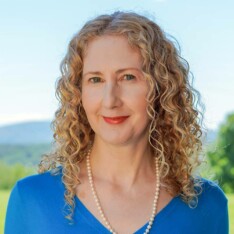The “Loud Words” that Ruled the Lockdowns in 2020

Contrary to rumors, Governor Cuomo did not issue an executive order on 22 March to “lock down” New York State. Instead, as the state’s official Covid-19 site clarifies, Cuomo announced “the ‘New York State on PAUSE’ executive order.”
The acronym implies that activities just halted temporarily, as if in hitting “pause,” Cuomo were only fetching a bowl of popcorn in the midst of an action film. Just press “play” again, and voila!—the hero would open his parachute, land safely, and save the world from the virus. Everything would continue as before.
Such remote control of a society is, of course, as much a delusion as the government’s ability to restrain Ethan Hunt in Mission: Impossible. Close “nonessential businesses,” and you create financial strain. Insist on “social distancing,” and you jeopardize the mental health of millions. Nothing would be the same.
But the illusion of control is a common one, which has spread tragically this year not simply through regulations but through language. As John Trenchard warned three hundred years ago in Cato’s Letters No. 13, “One of the great arts, therefore, of cheating men, is to study the application and misapplication of sounds—a few loud words rule the majority, I had almost said, the whole world.”
Cuomo not only ruled New Yorkers through his executive order but encouraged citizens to accede to it through “PAUSE,” which stands for “Policies that Assure Uniform Safety for Everyone.” Who wanted to protest “uniform safety?” No one. And so we locked down.
“Abused with Words”
As Trenchard argues, “Even in countries where the highest liberty is allowed,” certain men “mislead the multitude; who are ever abused with words, ever fond of the worst of things recommended by good names, and ever abhor the best things, and the most virtuous actions, disfigured by ill names.”
The good word “science,” for instance, has been abused to recommend the worst of things, from the closure of businesses to the disruption of worship services. “Follow science,” one congressperson insisted when a Catholic archbishop criticized Covid-19 restrictions on services. And so many followed the “science,” resulting in the isolation that has severely undermined the mental health of many citizens, including students.
Conversely, the most virtuous actions have been misrepresented in the popular press. The Great Barrington Declaration, with its scientific, compassionate, and thoughtful approach to Covid-19, was repeatedly misrepresented by newspapers. “Experts,” The New York Times insisted, dismissed it as “unethical” and “utter nonsense.”
What’s at stake is not only a debate among scientists on the duration of CovId restrictions, but our liberty. As Alex Berezow observes, when politicians say, “We’ll follow the science” they really mean “Do What I Say.”
But as Trenchard argued, “Every private subject has a right to watch the steps of those who would betray their country; nor is he to take their word about the motives of their designs, but to judge of their designs by the event.” New York designed “PAUSE” to promote “uniform safety,” but the government caused thousands of deaths in nursing homes.
“Remembering Guidance”
Despite these results, the elite continue to manipulate citizens by playing upon their fears and the language of safety. Like government officials, employers now urge workers to remember “guidance” that the safest holiday is one spent at home “only with those who live in your own home.” One university administrator warns, “Wearing masks and social distancing in your homes is the best protection.”
How did we come to accept “guidance” on what we wear and how we socialize in our own homes? As Thomas Gordon insists in Cato’s Letters No. 62: “What is it to a magistrate how I wash my hands, or cut my corns; what fashion or colours I wear. . . ?”
Surely it is time to resist encroachment on our liberties by the elite, who perpetually offer “guidance” on staying home while they “winterize” their properties with families from multiple households.
Above all, it is time for Americans to call things by their right names. “Covid” did not, as one headline implies, infect finances. The government lockdowns created financial stress.
There is nothing “social” about “social distancing,” especially when states encourage citizens to file complaints about “a business, location, or incident in your community” that violates “social distancing protocol.” That’s called informing.
And if our federal government really “CARES,” it would not have passed a new “relief” bill that Congressmen did not even have time to read, nor would the FDA have drawn out the trial process of the Moderna vaccine for nearly a year.
As Trenchard urged Britons in 1720, “Let mankind therefore learn experience from so many misfortunes, and bear no longer to hear the worst things called by the best names.” Trenchard and Gordon’s Cato’s Letters provided ideals for the American Founders in claiming liberty. Three hundred years later, their wisdom can help us reclaim our own.










